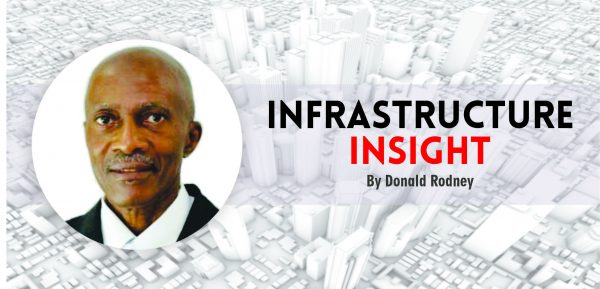Poorer countries of the world face a chronic and an acute shortfall of capital funds needed for infrastructure development, due largely to difficulties in mobilising internal reserves and, arguably, to an exploited past. In Guyana, one of the hemisphere’s poorest nations, there is anticipation that boosted revenues from a brand new petroleum industry could soon be a game changer in this regard. In July, 2018, on Al Jazeera’s The Stream, the Director of the Columbia Center on Sustainable Invest-ment, Lisa Sachs, recommended that Guyana invests in basic infrastructure that boosts production and allows other sectors to flourish, thereby reducing the risk of Dutch disease. She pointed to Fiji as a good example. A month later, the British High Commissioner to Guyana, Gregory Quinn, at a press conference, expressed a similar view that petroleum revenues should be used to develop the country’s infrastructure in sectors such as housing, education and health. He was commenting on a proposed part-cash distribution of oil proceeds.
These are just two instances of outsider views that some ordinary Guyanese have already arrived at and expressed, based on their daily experience of our weak infrastructure, and their hopes. Indeed to air a contrary view, a letter to Stabroek News expressed the view that funds should not be spent on infrastructure as this would increase imports and drain away petroleum revenues, and this too is a legitimate concern. Countries can falter in implementation of infrastructure due to inexperience and the unexpected complexity.
This series proposes to give an insight into infrastructure in Guyana, in ordinary language, from a construction economics standpoint. The intention is to help readers in their understanding of how infrastructure, construction and the built environment can support and benefit long-term development; to remove or reduce mystery on financial aspects; and to mitigate the view that infrastructure is spontaneously delivered by identifying some underlying issues to be aware of.
Reactions
The Minister of Finance, Winston Jordan, interviewed after his 2019 budget presentation in Parliament, declared that if the government announced an intention to build 50,000 houses by 2020 there would promptly be inadequate numbers of skilled carpenters, plumbers and masons in Guyana. However the government should move beyond observing the deficit and support a skills development/importation programme needed to close gaps at all levels of skill and competence. (Residually this task falls on contractors, whose role include assembling the workforce). What about harnessing free movement of artisans and operatives within Caricom? Historically, a labour force has often had to be imported to support an increased building programme: labour, possibly forced, to ancient Egypt to help build an empire infrastructure; or, similarly labour to ancient Rome; or immigrant labourers from the British Empire (this author’s father was one such labourer) allowed into Britain to supplement the Irish, and others, in post-world war reconstruction. And Caribbean peoples have emigrated to help build the original canal in Panama, enough to leave a legacy of an Afro-Caribbean community there. Hence there is ancient and recent precedent to respond to the Minister’s supposition and point him to possible initiatives.
Then recently the delayed completion and queried cost of the Cheddi Jagan International Airport expansion was highlighted. First due for completion in September 2015, the project’s various projected completion dates passed, during which time the Minister of Public Infrastructure, David Patterson, reportedly stated that there would be “severe consequences” if not completed on time. Penalties have been asked about. But what can fuel such uncertainties? It is submitted that the response requires an essay in its own right. Suffice it to say here, that construction time regulation and cost control require appropriate specialist input, otherwise those in charge can be as mystified as the general public.
Apart from reaction to episodes, however, this series will seek to use information available in the public domain to highlight some basics: for example, a corps of consultants in the industry for delivering master plans, designs, reports and valuations to enforceable standards of performance; and associations of licensed and efficient contractors, developed for timely realisation of an infrastructure programme. Both of these (i.e. consultants and contractors) have special duties to discharge, and both must have some degree of joint working, of a partnership nature, with the government, for a reasonably successful outcome in the industry. Therefore, an aspect of the series would be narrative on multi-disciplinary project teamwork, and on a government-industry partnership.
Image change
Finally, for now, where countries have been reasonably successful in making infrastructure a cornerstone to national development, this has been based on data, evidence-based decisions and long-term plans. However, in Guyana the infrastructure sector faces political futsal, and decision-making restricted to electoral cycles. There is a distinct lack of empirical information to assist sectorial management in, for example, anticipation of tender responses to novel designs or curbing high outflows of foreign exchange due to spikes in construction activity. Narrative on these aspects would also be relevant.
And what about sustainability of the ‘new industry’? The recent lessons from oil-rich neighbours, like Brazil, Venezuela and Trinidad and Tobago, is that bolstered construction can still be stymied when the economy falters. What can be learnt from this? It may be hard to visualise exporting Guyana’s construction to earn forex in times of domestic decline, but nevertheless we should seek to avoid repeating mistakes of others. Perhaps our construction industry needs an image make-over in our own minds.
Donald Rodney is the holder of a BSc in quantity surveying from the Faculty of Urban and Regional Studies of Reading University, England; is also a Fellow of the Royal Institution of Chartered Surveyors, and a construction arbitrator. He formerly headed the quantity surveying section within the then Ministry of Works and Transport, in Guyana and in Botswana, and also has years of work experience in the UK and in other parts of the Caribbean.






